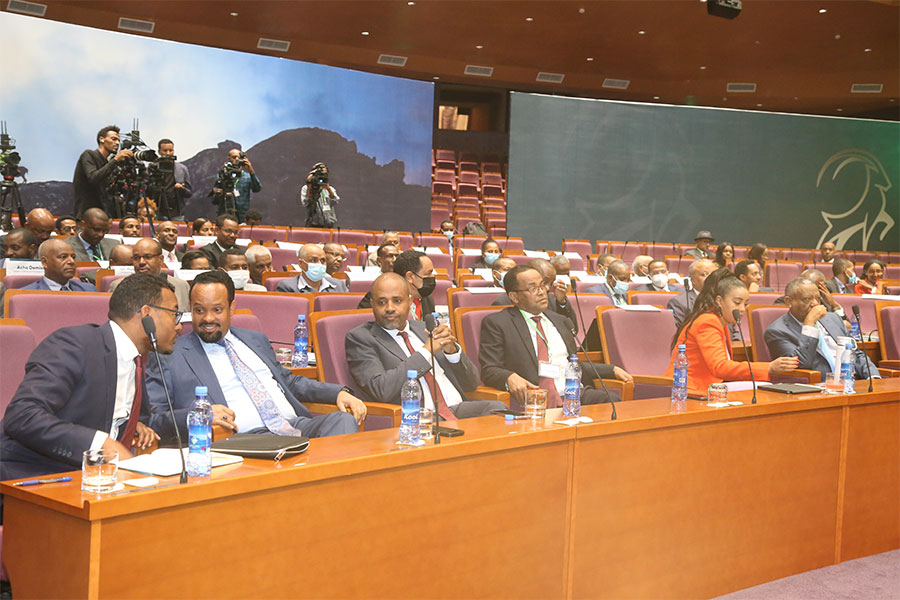
Fortune News | Jun 25,2022
Sometime in the early 1990s, a lavish wedding is thrown at a posh Northern California hotel by a Middle Eastern tycoon who spares no expense to wed a young Ethiopian diaspora couple. There is the usual chaos, disorder and mad rush that attend Ethiopian events, but the hotel staff keeps strict order, and the event progresses ceremoniously.
In the banquet hall, tucked into a small semi-private enclave and attended by a few corteges of admirers are Tilahun Gessesse, Mahmoud Ahmed and Alemayehu Eshete, the legends of modern Ethiopian music. There are other musicians, too, but they garner nary the attention of the guests as do these three, particularly Tilahun Gessesse.
For a collection of a whole tribe of diaspora that left the mother country during the Dergueand settled in America, the music legends represent a little window into a bygone era. An excited father drags two of his reluctant teenage children to the enclave with a tissue paper and a pen in hand seeking an autograph from Tilahun Gessesse. He gets the signature from the legend but fails to impart his enthusiasm to his kids who look embarrassed and detached by the whole drama.
There, too, are the newcomers to the Ethiopian diaspora, those who have arrived during the Dergueregime and following the installment of EPRDF. The newcomers are just as disinterested as the kids about the legendary musicians in their midst. The shining rays of Ethiopian music's Golden Age have bypassed them, and now they live in the glimmering light of their good fortunes for having escaped and survived the crushing jaws of death and tyranny.
Ethiopia’s Golden Age of music emerges in the 1950s.
Ethiopia’s Golden Age of music emerges in the 1950s when “every imperial institution of note, from the army, the police and the imperial bodyguard to the Haile Selassie Theatre, had its own orchestra, comprising scores of disciplined musicians who enjoyed the tutelage of dedicated foreign bandleaders, such as the Austrian Franz Zelwecker and the Armenian Nerses Nalbandian,” as The Independent newspaper wrote in May 2008.
In the late ’60s and early '70s, Ras, All-Star, Zula, Venus, Wabe Shebele, Roha and Dahlak bands have started to rock the city in hotel banquet halls and night clubs. There are other bands, too. Dashen and the Blue Diamonds, young childhood friends who have learned to play the guitar and trap-sets, croon songs of the Beatles, Aretha Franklin and James Brown.
There are also the Sunday music shows, one of the venues of the young musicians, in an underground tavern next to the National Theater where the young, the hip and the fashionable in-crowd dance and strut with Afro-style hairdos and bell-bottom pants.
At Wabe Shebele Hotel, a permanent band shipped from the Congo is installed, adding African rhythm to the city’s vibrant music scene. Music echoes and ricochets in Addis Abeba from Webe Bereha above Piassa down to the red-light district of Nefas Silk. Eventually, the music contingent spreads even to Dire Dawa when in 1969 the Blue Diamonds travel by train to that exotic city and ignite it in a performance that packs a young audience at the French Club.
Ethiopia’s Golden Age of music emerges in the 1950s.
In those heady days of music, the young musicians eagerly share their new skills and musical ideas with the old guard, for they have burst into the Ethiopian music scene with electric bass and lead guitars. Alas, that collaboration is soon to be snuffed out as the young musicians, all from the upper echelon of society, flee a pending revolution to the safety of Europe and America, leaving behind the old-guard legends like Tilahun and Alemayehu in the employ of the government.
The new military junta does not look kindly on musical bands and disbands the whole lot along with the dismantlement of the imperial armies and police. The young musicians, living in the diaspora during the reign of theDergue, will soon abandon music and enter more lucrative fields of studies and careers. They are not into music as their profession, except a few, more for the fun of it and youthful exuberance.
In the era of EPRDF, Tilahun, Alemayehu and the other legends will soon reemerge again, whittled and wounded, but not vanquished altogether, serenading the old melodies in a different kind of way. In the diaspora, they start to showcase their timeworn tunes at public events, appearances and private parties - but the recreated music lacks the glow and glamour of the bygone days.
Now, sitting in an enclave of a wedding banquet and waiting for their turn at the microphone, the legends appear in frayed old-tuxedo suits, tired and worn, never really having achieved the status that they deserve, nor having received the material rewards that are truly due for what they accomplished musically in Ethiopia.
Yes, there are some accolades and recognition from international circles for what our musical legends have achieved. The Independent, writing about the efforts of Francis Falceto, who reintroduced that era’s music to an international audience, says, “[Listen] to the Golden Years of Modern Ethiopian Music, and the essential quality of an alien familiarity hits you from the first note. It's as if Falceto has stumbled on a kind of modern musical equivalent of the Galapagos Islands, where [the music has] mutated into strange and wonderful hybrids, executed with a level of musicianship that could stand alongside the best in the West.”
To a generation that came of age in that swinging musical era and escaped the credulity of a Dergueand the dictums of the rebel group that rules over the capital, it is a Herculean task to sway a younger generation into believing that there is a musical Golden Age in Ethiopia. For those who partake in it, it is indeed like receiving a gift from the gods, or like sipping the nectar of the Olympians that confirms longevity and even immortality.
PUBLISHED ON
Jul 06,2019 [ VOL
20 , NO
1001]


Fortune News | Jun 25,2022

Commentaries | May 25,2019

Radar | Apr 21,2024

Commentaries | Nov 16,2019

Radar | Nov 29,2020

Commentaries | Aug 17,2019

Radar | Jan 05,2020

Viewpoints | Mar 26,2022

Fortune News | Aug 06,2022

Radar | Oct 27,2024

Dec 22 , 2024 . By TIZITA SHEWAFERAW
Charged with transforming colossal state-owned enterprises into modern and competitiv...

Aug 18 , 2024 . By AKSAH ITALO
Although predictable Yonas Zerihun's job in the ride-hailing service is not immune to...

Jul 28 , 2024 . By TIZITA SHEWAFERAW
Unhabitual, perhaps too many, Samuel Gebreyohannes, 38, used to occasionally enjoy a couple of beers at breakfast. However, he recently swit...

Jul 13 , 2024 . By AKSAH ITALO
Investors who rely on tractors, trucks, and field vehicles for commuting, transporting commodities, and f...

Nov 1 , 2025
The National Bank of Ethiopia (NBE) issued a statement two weeks ago that appeared to...

Oct 25 , 2025
The regulatory machinery is on overdrive. In only two years, no fewer than 35 new pro...

Oct 18 , 2025
The political establishment, notably the ruling party and its top brass, has become p...

Oct 11 , 2025
Ladislas Farago, a roving Associated Press (AP) correspondent, arrived in Ethiopia in...